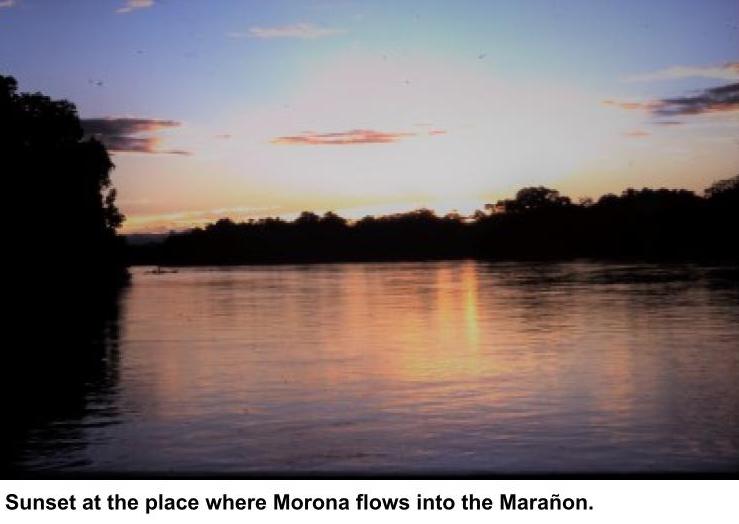Chapter 29: From Shoroya Cocha to the Border of Ecuador
Visiting indigenous villages, loggers, and the military along the Morona - Daily life in the houseboat.
AS TOLD BY JOHNAGERSTEN
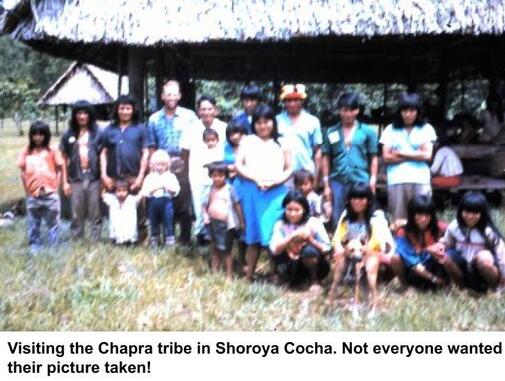
Visiting the Chapra village Shoroya Cocha
It did not take long to travel upriver from Pincha Cocha to Shoroya Cocha, home of the Chapra chief, Tariri. (“Cocha” means a small lake) We docked and tied up next to a few canoes by a little clearing at the edge of the jungle. As soon as the boat was secured, I started up the path through the forest to the village, and I was well received there. They remembered me from my trip earlier this year when I had helped Tariri put together a lawnmower. Some of the villagers followed me back to the boat to buy some medications, and after they had bought what they wanted, our whole family returned with them to the village. It was about a half-hour walk along a muddy path. Some places were so wet and deep that we had to balance on logs to get across. The villagers were amazed to see our two small children with light skin and almost white hair. They pointed and made comments in their language, so we had no idea what they were saying, but they seemed excited.
It did not take long to travel upriver from Pincha Cocha to Shoroya Cocha, home of the Chapra chief, Tariri. (“Cocha” means a small lake) We docked and tied up next to a few canoes by a little clearing at the edge of the jungle. As soon as the boat was secured, I started up the path through the forest to the village, and I was well received there. They remembered me from my trip earlier this year when I had helped Tariri put together a lawnmower. Some of the villagers followed me back to the boat to buy some medications, and after they had bought what they wanted, our whole family returned with them to the village. It was about a half-hour walk along a muddy path. Some places were so wet and deep that we had to balance on logs to get across. The villagers were amazed to see our two small children with light skin and almost white hair. They pointed and made comments in their language, so we had no idea what they were saying, but they seemed excited.
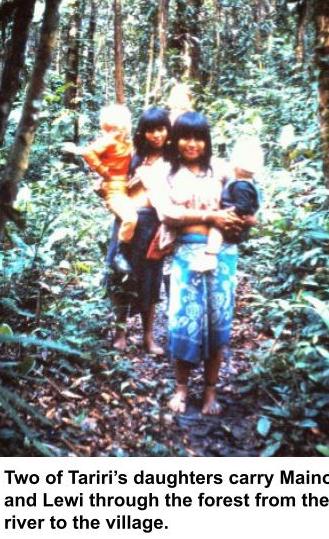
Watering the seed planted by the Wycliffe Bible Translators
It was late afternoon when we entered the village, and people gathered for a service in Tariri’s house. Some were already believers and participated happily in the singing. It was moving to hear them sing hymns we knew and loved in their own language. They had a little songbook and parts of the New Testament in their language thanks to the Wycliffe Bible translators.
Two female missionaries from the Wycliffe had come and lived among these villagers a few years ago. They had learned the language and started the long and arduous process of creating a written language so they could translate the Bible for them. As mentioned, they had translated parts of the New Testament already and the work was now continued by translators in Yarina Cocha, the Wycliffe base about 500 miles further south.
Tariri’s oldest son, Tsirimpo, led the service for us. We could tell that he had truly had an encounter with Jesus, and we developed a strong relationship with him. His feet had once been severely injured and he had been flown in a small pontoon plane to the mission hospital on the Wycliff base. There he received an operation to enable him to walk again. He also had tuberculosis, a disease that we discovered plagued many of the indigenous people.
I gave a simple sermon in Spanish which Tsirimpo translated to Chapra. The service was quite short this time because darkness descends quickly in the tropical jungle. We arrived back at the boat just before it got dark. The villagers who had come back with us to show us the way and help carry the children had to return through the jungle to their village in complete darkness, but they assured us they knew the path like the back of their hands.
It was late afternoon when we entered the village, and people gathered for a service in Tariri’s house. Some were already believers and participated happily in the singing. It was moving to hear them sing hymns we knew and loved in their own language. They had a little songbook and parts of the New Testament in their language thanks to the Wycliffe Bible translators.
Two female missionaries from the Wycliffe had come and lived among these villagers a few years ago. They had learned the language and started the long and arduous process of creating a written language so they could translate the Bible for them. As mentioned, they had translated parts of the New Testament already and the work was now continued by translators in Yarina Cocha, the Wycliffe base about 500 miles further south.
Tariri’s oldest son, Tsirimpo, led the service for us. We could tell that he had truly had an encounter with Jesus, and we developed a strong relationship with him. His feet had once been severely injured and he had been flown in a small pontoon plane to the mission hospital on the Wycliff base. There he received an operation to enable him to walk again. He also had tuberculosis, a disease that we discovered plagued many of the indigenous people.
I gave a simple sermon in Spanish which Tsirimpo translated to Chapra. The service was quite short this time because darkness descends quickly in the tropical jungle. We arrived back at the boat just before it got dark. The villagers who had come back with us to show us the way and help carry the children had to return through the jungle to their village in complete darkness, but they assured us they knew the path like the back of their hands.
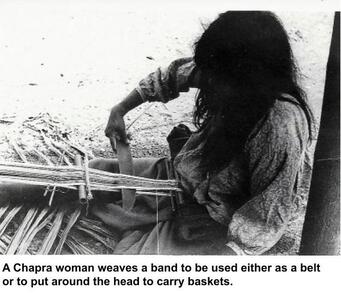
Services and thunderstorms
We stayed in Shoroya Cocha for three days and held several services and many conversations with different people. I’ll never forget the last service when we asked if anyone wanted to believe in God and accept Jesus as their savior. Three adult men with feater crowns, painted faces, and rifles in hand came forward and knelt to pray. It moved us deeply to hear them praying loudly in their own language. After we had returned to the boat, one of these men came to see us along with his wife. She also wanted to give her life to Jesus. After praying together, it was exciting to hear her say she felt like she had received a new heart.
One of the evenings there we experienced the worst thunderstorm we had ever been in. We had already settled for the night in the boat and it was completely dark. First, it started to pour down rain, and then it started to thunder. At the same time that we heard a strong thunderclap, lightning struck one of the trees close to the boat. The lightning was so constant that I could read my Bible by it while the thunder rolled above us! Our motorist was so scared he hid completely under his blanket in the wheelhouse. He had never experienced a storm that strong either. Incidentally, he was supposed to be our guide, but it turned out he had never actually traveled on the Morona River! He was still of great help to us, though.
We stayed in Shoroya Cocha for three days and held several services and many conversations with different people. I’ll never forget the last service when we asked if anyone wanted to believe in God and accept Jesus as their savior. Three adult men with feater crowns, painted faces, and rifles in hand came forward and knelt to pray. It moved us deeply to hear them praying loudly in their own language. After we had returned to the boat, one of these men came to see us along with his wife. She also wanted to give her life to Jesus. After praying together, it was exciting to hear her say she felt like she had received a new heart.
One of the evenings there we experienced the worst thunderstorm we had ever been in. We had already settled for the night in the boat and it was completely dark. First, it started to pour down rain, and then it started to thunder. At the same time that we heard a strong thunderclap, lightning struck one of the trees close to the boat. The lightning was so constant that I could read my Bible by it while the thunder rolled above us! Our motorist was so scared he hid completely under his blanket in the wheelhouse. He had never experienced a storm that strong either. Incidentally, he was supposed to be our guide, but it turned out he had never actually traveled on the Morona River! He was still of great help to us, though.
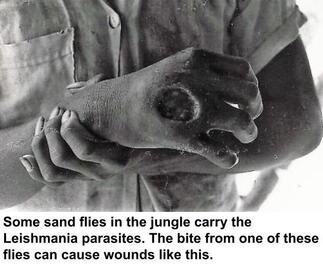
Mosquitos, gnats, and infected bites
What we call mosquitoes in English, they called “sancudo” in the jungle. There were happily not a lot of those along the Morona river. However, what they called “mosquitoes”, tiny little gnats in huge swarms, made life unpleasant for everyone in this area. They were bothersome all day, only to disappear when it got dark. At least that was a blessing! People in the mestizo villages often wore long sleeves and long pants to combat the problem. Even many women wore long, thin pants under their skirts. The Chapra on the other hand seemed to have leather skin. Small boys ran around completely naked, the men usually did not wear shirts, and the women’s traditional blouse and skirts left their arms and legs bare.
The gnat bites left small sores on our skin, and mosquito repellent did not deter them. The sores were easily infected in the warm, humid climate and by the dirty river water we used for washing. Gro, the children, and I soon looked like we had measles. Gro’s bites were particularly bad and we counted more or less eighty infected bites just on one leg! We were alarmed when we saw a red and blue line move up from one of her sores above the knee. A blood infection! We were many days away from doctors or hospitals, but we had some penicillin with us she could take. We treated the sores with antibiotic ointments morning and night, and of course, we prayed a lot over the situation. To our relief, we could see the infection retreating, and we were very thankful when the fever and pain left after a few days of treatment.
What we call mosquitoes in English, they called “sancudo” in the jungle. There were happily not a lot of those along the Morona river. However, what they called “mosquitoes”, tiny little gnats in huge swarms, made life unpleasant for everyone in this area. They were bothersome all day, only to disappear when it got dark. At least that was a blessing! People in the mestizo villages often wore long sleeves and long pants to combat the problem. Even many women wore long, thin pants under their skirts. The Chapra on the other hand seemed to have leather skin. Small boys ran around completely naked, the men usually did not wear shirts, and the women’s traditional blouse and skirts left their arms and legs bare.
The gnat bites left small sores on our skin, and mosquito repellent did not deter them. The sores were easily infected in the warm, humid climate and by the dirty river water we used for washing. Gro, the children, and I soon looked like we had measles. Gro’s bites were particularly bad and we counted more or less eighty infected bites just on one leg! We were alarmed when we saw a red and blue line move up from one of her sores above the knee. A blood infection! We were many days away from doctors or hospitals, but we had some penicillin with us she could take. We treated the sores with antibiotic ointments morning and night, and of course, we prayed a lot over the situation. To our relief, we could see the infection retreating, and we were very thankful when the fever and pain left after a few days of treatment.
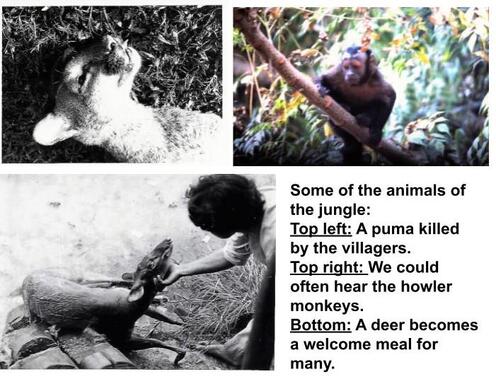
Many dangers lurk in the jungle.
Life on board a small boat with two small children could be challenging. Maino was 4 and a half years old, and Lewi was almost 18 months. It was very hard for him to keep his balance in the boat, and there was not much room for them to move around and play. Sometimes we would make a stop so they could go outside and run around and play a little. Once we stopped at a sandbank, and the children walked hand in hand along the beach. Suddenly, a large alligator appeared quickly right next to them and went into the water with a big splash! The children screamed and were terrified, and so were we! The alligator had been sunning itself, hidden behind some grass. We had learned our lesson and were much more careful after that.
Life on board a small boat with two small children could be challenging. Maino was 4 and a half years old, and Lewi was almost 18 months. It was very hard for him to keep his balance in the boat, and there was not much room for them to move around and play. Sometimes we would make a stop so they could go outside and run around and play a little. Once we stopped at a sandbank, and the children walked hand in hand along the beach. Suddenly, a large alligator appeared quickly right next to them and went into the water with a big splash! The children screamed and were terrified, and so were we! The alligator had been sunning itself, hidden behind some grass. We had learned our lesson and were much more careful after that.
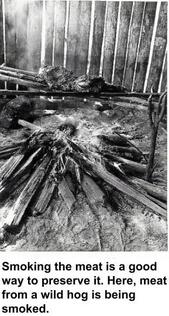
There were many other dangers lurking in the jungle besides alligators: snakes, poisonous insects and spiders, and many different animals. Fortunately, pumas and jaguars tend to avoid people and inhabited areas, but we often saw “sajino” (a type of wild pig) and large ant eaters swimming in the river. We also spotted different monkeys in the trees, and often we could hear them, even if we couldn't see them. In the water were piranhas and other fish that bite or sting. The stingray lay on the bottom in shallow places, and the sting from their tail was not pleasant if you happened to step on it. We treated several people who had sores and even gangrene on their feet from such encounters with the sting ray. There were also schools of small fish called canero who would attack animals or people, especially if they smelled blood. Looking back at our time in the jungle, we can only offer thanks to God for his protection.
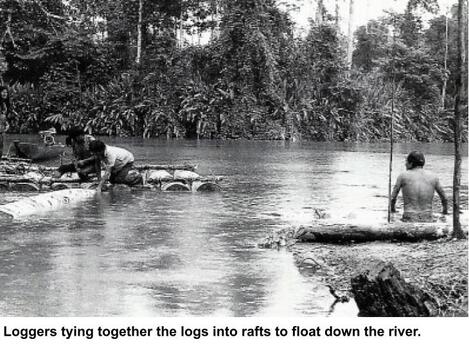
Among Wampis and loggers.
We continued traveling upriver toward the north and we would dock at every house we saw if it looked like someone was home. Some of these homes belonged to members of the Wampis tribe. They would often live at the mouth of small tributaries that emptied into Morona. They were very poor, and several requested that we open schools. We were told that there were small villages further into the jungle along the tributaries on either side of Morona. A few of the younger men we met, knew a little Spanish, and they felt that if there were schools, those villagers deeper in the jungle would move out to the riverbanks of Morona.
One place we docked turned out to be a logger’s camp. When the men returned from their work that afternoon, we held a service. Everyone attended, and at the end of the service when we invited them to accept Jesus as their savior, 10 tough men came forward. It was deeply moving to see these loggers on bended knees asking God for forgiveness and help to live better lives. We continued the trip the next day but prayed and believed that the seed sown would bear fruit. It is the Lord that gives the growth.
Ministering at a military base.
We were now getting close to Ecuador and docked at a good size military base about 10 miles from the border. We had to stop there to get permission to continue upriver. The captain of the base was very excited about having visitors. The only visitor they had was the supply boat that came every three months from Barranca on the Marañon. He wanted us to stay a bit and invited us to hold a service that evening for the soldiers. Then he ordered the cook to prepare a nice meal for us and arranged for a shooting demonstration. Some of the soldiers stood at the bank shooting at different things on the other side of the river and competing to see who had the best aim. The captain’s family was in Lima, and we could see he really enjoyed visiting with us and the children.
That afternoon, the soldiers were ordered to get cleaned up for the service. To protect themselves from the gnats in the daytime, the soldiers would rub their skin with diesel and it would stain their clothing. But now they lined up, newly bathed and with clean clothes to attend the service. On orders from the captain, they marched into the meeting house, which was a palm roof over some wooden benches on a dirt floor. The captain also ordered them to be quiet and listen closely. I think it is the only time I have held a service where the congregation was ordered to participate! At least they did seem to enjoy it. It was probably a nice change from their otherwise routine lives as soldiers deep in the jungle. These soldiers came from many different places in the jungle, and some even from other parts of the country.
We sang a few songs, and the accordion was a hit here just as it usually was wherever we visited. Some of the soldiers seemed to know some of the songs and sang along. Maybe this was a good opportunity for them to declare themselves as believers. We spoke simply about the Gospel and salvation plan, and at the end of the service, two of the soldiers dedicated themselves to Christ. We could feel the presence of the Lord. As we prepared to continue our journey the next day, the captain thanked us heartily for the visit and asked us to please stop again on the way downriver.
We continued traveling upriver toward the north and we would dock at every house we saw if it looked like someone was home. Some of these homes belonged to members of the Wampis tribe. They would often live at the mouth of small tributaries that emptied into Morona. They were very poor, and several requested that we open schools. We were told that there were small villages further into the jungle along the tributaries on either side of Morona. A few of the younger men we met, knew a little Spanish, and they felt that if there were schools, those villagers deeper in the jungle would move out to the riverbanks of Morona.
One place we docked turned out to be a logger’s camp. When the men returned from their work that afternoon, we held a service. Everyone attended, and at the end of the service when we invited them to accept Jesus as their savior, 10 tough men came forward. It was deeply moving to see these loggers on bended knees asking God for forgiveness and help to live better lives. We continued the trip the next day but prayed and believed that the seed sown would bear fruit. It is the Lord that gives the growth.
Ministering at a military base.
We were now getting close to Ecuador and docked at a good size military base about 10 miles from the border. We had to stop there to get permission to continue upriver. The captain of the base was very excited about having visitors. The only visitor they had was the supply boat that came every three months from Barranca on the Marañon. He wanted us to stay a bit and invited us to hold a service that evening for the soldiers. Then he ordered the cook to prepare a nice meal for us and arranged for a shooting demonstration. Some of the soldiers stood at the bank shooting at different things on the other side of the river and competing to see who had the best aim. The captain’s family was in Lima, and we could see he really enjoyed visiting with us and the children.
That afternoon, the soldiers were ordered to get cleaned up for the service. To protect themselves from the gnats in the daytime, the soldiers would rub their skin with diesel and it would stain their clothing. But now they lined up, newly bathed and with clean clothes to attend the service. On orders from the captain, they marched into the meeting house, which was a palm roof over some wooden benches on a dirt floor. The captain also ordered them to be quiet and listen closely. I think it is the only time I have held a service where the congregation was ordered to participate! At least they did seem to enjoy it. It was probably a nice change from their otherwise routine lives as soldiers deep in the jungle. These soldiers came from many different places in the jungle, and some even from other parts of the country.
We sang a few songs, and the accordion was a hit here just as it usually was wherever we visited. Some of the soldiers seemed to know some of the songs and sang along. Maybe this was a good opportunity for them to declare themselves as believers. We spoke simply about the Gospel and salvation plan, and at the end of the service, two of the soldiers dedicated themselves to Christ. We could feel the presence of the Lord. As we prepared to continue our journey the next day, the captain thanked us heartily for the visit and asked us to please stop again on the way downriver.
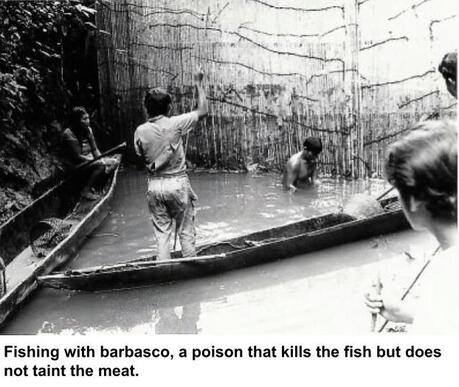
The water level gets too low to travel
We reached the border in just a few hours' travel from the military base. There the military had a small outpost manned by a few soldiers. After stopping there overnight, we headed downriver again. The water levels were sinking, and this far up the river, it was already narrow and quite shallow. We were docking at a clearing with a couple of houses when there was a miscommunication between the motorist and me, the steersman. We crashed the side of the boat into the bank, and a log sticking out from land went through the wall right by Gro who was cooking dinner! We were all shaken up, but grateful that the log had not hit Gro nor caused damage to the boat under the waterline. We ended up having to stay in that place for 5 days. There was not enough water in the river to continue!
While we were there, a couple of soldiers from the border outpost stopped by. They were on their way back to the base and they had some sacks filled with turtle eggs they had dug up from a sandbank. They would salt them down, then send them to a town where they would be sold as a delicacy. This sale would bring the soldiers a little extra income. They gave us some, and Gro made an omelet with them. The consistency was different than an omelet from chicken eggs, but it was good.
We reached the border in just a few hours' travel from the military base. There the military had a small outpost manned by a few soldiers. After stopping there overnight, we headed downriver again. The water levels were sinking, and this far up the river, it was already narrow and quite shallow. We were docking at a clearing with a couple of houses when there was a miscommunication between the motorist and me, the steersman. We crashed the side of the boat into the bank, and a log sticking out from land went through the wall right by Gro who was cooking dinner! We were all shaken up, but grateful that the log had not hit Gro nor caused damage to the boat under the waterline. We ended up having to stay in that place for 5 days. There was not enough water in the river to continue!
While we were there, a couple of soldiers from the border outpost stopped by. They were on their way back to the base and they had some sacks filled with turtle eggs they had dug up from a sandbank. They would salt them down, then send them to a town where they would be sold as a delicacy. This sale would bring the soldiers a little extra income. They gave us some, and Gro made an omelet with them. The consistency was different than an omelet from chicken eggs, but it was good.
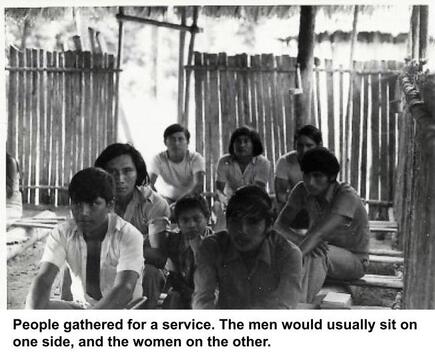
We also had time to have many conversations with the people who lived in the 2 - 3 houses in the clearing. They told us that the Achuar tribe lived along the tributaries to the upper part of Morona both on the Ecuador and Peru side of the border. They were warriors and had many skirmishes among themselves. Earlier, they were known as Jivaro and had been known for beheading and shrinking the heads of their adversaries. We did not have the opportunity to visit one of their villages on this trip but were able to some years later.
One evening, Gro and I borrowed a canoe and paddled a little way down the river to try to hunt. We were out of fresh meat and thought maybe we could get something. I had a rifle and we knew that many animals come to the riverbank to drink at dusk. With a good flashlight, you can see their eyes light up, and we saw many shining red eyes, some small and some quite large. I counted 24 pairs. Then we realized that this place was crawling with alligators! It didn’t take us long to decide to turn around and row quickly back to the safety of our boat!
Returning downriver
After the fifth day stranded at this place, the water levels started to rise after a hard rain. We left after an early breakfast and had no trouble getting down the river. We had planned to stop at many places on the way back, but because of the five-day delay, we only took time to visit a few villages. We still had a long journey ahead of us. The plan was to reach Yurimaguas, where I had built the boat, by Christmas.
As we reached Puerto America, the village at the mouth of the Morona, we saw that there was a tug boat with lumber docked there. It was leaving the next day for Iquitos further down the Marañon. That evening we finished letters to our parents and a few others so we could send them with the tug boat to be mailed from Iquitos. It had been several weeks now since we had been able to send any word to our families We left Puerto America and returned to the larger Marañon River on November 28th, a little over a month since we had started our journey up the Morona from this same village.
Reflecting on the experience gained
The many experiences we had during this trip taught us a lot and would mean a lot in the times ahead of us. We learned many practical things about living in a boat, food, nature, and last but not least, we learned a lot about the people living in this area. There was no doubt that there was a strong need for the gospel, discipleship, medical aid, and schools and education. Several people had asked us to start schools, something the Wycliffe Bible Translator ended up doing in indigenous villages both in Morona and other areas in the years to come in cooperation with the Peruvian government. We felt for the needs along the Morona, but at the same time felt that we should not settle quite that far from civilization. We wanted to be wherever God wanted us, so we asked Him to lead us in finding a place to live and to use as our base for traveling.
One evening, Gro and I borrowed a canoe and paddled a little way down the river to try to hunt. We were out of fresh meat and thought maybe we could get something. I had a rifle and we knew that many animals come to the riverbank to drink at dusk. With a good flashlight, you can see their eyes light up, and we saw many shining red eyes, some small and some quite large. I counted 24 pairs. Then we realized that this place was crawling with alligators! It didn’t take us long to decide to turn around and row quickly back to the safety of our boat!
Returning downriver
After the fifth day stranded at this place, the water levels started to rise after a hard rain. We left after an early breakfast and had no trouble getting down the river. We had planned to stop at many places on the way back, but because of the five-day delay, we only took time to visit a few villages. We still had a long journey ahead of us. The plan was to reach Yurimaguas, where I had built the boat, by Christmas.
As we reached Puerto America, the village at the mouth of the Morona, we saw that there was a tug boat with lumber docked there. It was leaving the next day for Iquitos further down the Marañon. That evening we finished letters to our parents and a few others so we could send them with the tug boat to be mailed from Iquitos. It had been several weeks now since we had been able to send any word to our families We left Puerto America and returned to the larger Marañon River on November 28th, a little over a month since we had started our journey up the Morona from this same village.
Reflecting on the experience gained
The many experiences we had during this trip taught us a lot and would mean a lot in the times ahead of us. We learned many practical things about living in a boat, food, nature, and last but not least, we learned a lot about the people living in this area. There was no doubt that there was a strong need for the gospel, discipleship, medical aid, and schools and education. Several people had asked us to start schools, something the Wycliffe Bible Translator ended up doing in indigenous villages both in Morona and other areas in the years to come in cooperation with the Peruvian government. We felt for the needs along the Morona, but at the same time felt that we should not settle quite that far from civilization. We wanted to be wherever God wanted us, so we asked Him to lead us in finding a place to live and to use as our base for traveling.
